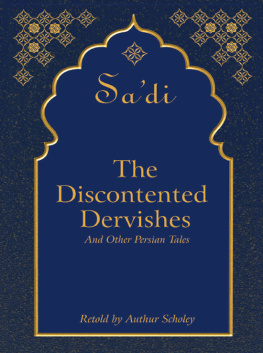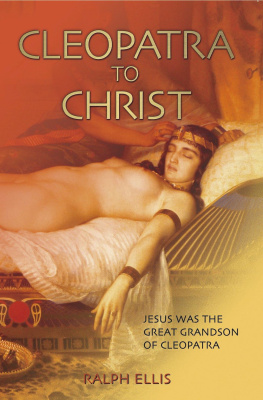Invited to dramatise several of Sadis stories for radio, Arthur Scholey found himself wandering in delight in The Rose Garden, and The Orchard, among others of the poet and mystics twenty-three books. Numerous tales and stories added to the fragrance of Sadis flowers and fruit, and the re-told ones in The Discontented Dervishes (and its companion volume of Rumi stories, The Paragon Parrot) is the result a taste, a scent, it is hoped, of the great works beyond.
This collection stems from Arthur Scholeys lifelong love of stories of all kinds from folk tale, fable, sage, legend and parable, through to anecdote, joke and myths ancient and urban.
Collecting, creating and passing on stories, within todays fascinatingly burgeoning media, have led him to adapt others and his own work in collections of his own and also for radio, tv, and stage performances. He also works with illustrators, and with composers on operas, dramatic cantatas and song collections.
He maintains a story archive of clamouring stories which continue to be told in one form or several others, but likes to keep in mind a reverence for the earliest storytellers, from those who unrolled mats in the market-place and compelled passers-by to stop and listen, those able to spell-bind after-feast audiences with exploits from national sagas, to the ancient mariner who can stop one of three from the wedding festivity, right on to todays stand-up comedian and pub raconteur. All carry on the magic from Once upon a time to Hi, did you hear the one about...
He lives in London.
The Discontented Dervishes
And Other Persian Tales Retold from Sadi by
Arthur Scholey
Watkins Publishing
London
Contents
Foreword
Travellers often bring their friends sugar from Egypt as a rare gift. I come empty-handed from my travels but here, instead, are my words. You may find them sweeter than candy, and perhaps they may last longer...
Sadi, one of the greatest Persian poets and story-tellers, was right. His lyrics and tales, his wisdom, commonsense and humour are as sweet today as when first written down in the thirteenth century.
He was born and died (c12131291) in Shiraz, and eventually became royal poet to King Sad Atabak. But he started out as a poor orphan, and because of Mongol invasions travelled for thirty of his eighty years, journeying, it is said, through Europe, Abyssinia, Egypt, Syria, Pakistan, Armenia, Asia Minor, Arabia, Persia, Afghanistan, India and Italy.
Only once did I grumble at how Fortune had treated me. I was so poor that I could not even afford shoes, and went into the mosque at Kiyah with a sore and complaining heart. There I saw a man with no feet...
We do not have many details of his life. It is thought that his father died when Sadi was very young, particularly because he later wrote a moving poem about the love and care that should be shown to orphans. His desire to study drove him to the centre of learning at that time, Baghdad, but he was penniless and without influential friends. Then he managed to catch the ear of a wealthy resident, who generously provided funds for him to study at a private school where he stayed until he was twenty-one.
The next problem was how to enter the university. He wrote some verses and sent them off to the Professor of Literature at Nizamiah College, Baghdad. The verses pleased Shams-ud-din Abdul Farah (Sadi had considerately dedicated the verses to him) and he found himself helped financially again and admitted to the university. He worked hard and got a scholarship which enabled him to pursue his studies.
For the next forty-three years he stayed in Baghdad where he gained a reputation as a speaker and poet. He might have spent the rest of his life there, but the city was sacked. Sadi fled for his life, and so began his travels, during which he even became a slave and was put to work in the trenches of Tripoli.
He was a Sufi, and it may be that throughout his journeys he wore the simple woollen robe of the followers of this way of life. The Arabic word suf means wool but also has a meaning connected with seeking the reality of things, the essence of life. The Sufis of Persia were of the faith of Islam, accepting the teachings of Mohammed, but essaying to go further in seeking the reality of God, trying to become one with him.
Sadi married twice (the amusing story included here about his first wife should not perhaps be taken too literally!). He had a son who died when a child (see the final story in this collection), and a daughter who is said to have become the wife of another celebrated poet, Hafiz.
When he retired to his native Shiraz, he received royal patronage and wrote twenty-three books in all; the most famous of these are the Gulistan (The Rose Garden) and the Bustan (The Orchard). Into these he put the numerous stories he had both collected and made up, fragments from his own experiences, above all the wisdom of a lifetime, woven into the poetry.
While any poetry is difficult to translate (and, according to an Eastern saying, Each word of Sadi has seventy-two meanings!), the stories are part of the poetic structure of the books and I have concentrated on re-telling some of them. They range from healthy eating
A king once asked a doctor how much he should eat daily.
The weight of a hundred dirams, the doctor said.
Will this give me sufficient strength? the king asked.
It will carry you, came the reply. If you eat more, you will have to carry it.
to a meaning of holiness:
A pious man once dreamed that he saw a king in Paradise and a pious man in Hell.
Thats not right, he exclaimed. Surely it should be the other way round?
Not at all, came the answer. The king is in Heaven because he loved and befriended dervishes; the pious man is in Hell because he associated too much with kings.
Among the many characters Sadi beings to us are the renowned chieftain Hatim Tai and his famed horse (and the assassin sent to kill him) as well as the old womans cat which sets out in search of better accommodation; meet an astronomer who thinks he knows everything, a youth who smiles at death and another who escapes it through a clever old mans trick; a fox is frightened but not so much that he loses his craftiness, a boastful pupil learns every lesson but one. Birds, beasts and insects share these stories with slaves, beggars, kings, servants, teachers good and bad, and dervishes including the two discontented ones whose complaints happen to be overheard by a disguised ruler...
And all the tales, be they simple, complicated, fascinating, humorous, puzzling or profound, go on yielding more and more of Sadis seventy-two meanings as one takes them in and lets them rattle around heart and mind.
Some translations:
The Rose Garden
Tr. Edward B Eastwick (1852),
re-issued by The Octagon Press Ltd
The Gulistan
Tr. Sir Richard Burton (1888),
published 1928, Philip Allan & Co. Ltd
The Bustan of Sadi
Tr. A. Hart Edwards (1911) John Murray
(selections)
The Bustan
Tr. H. Wilberforce Clarke
(1879), W. H. Allen
Selections from The Bustan
(IQD-I-MANZUM)
(Newul Kishore Press, Lucknow)
The Garden of Fragrance
Tr. G. S. Davie (1882) into English verse
(Kegan, Paul, Trench & Co.)
The Discontented Dervishes
... and other tales of the humble and the proud
The Discontented Dervishes
K ING SALIH, one of the Kings of Syria, used to get up before dawn and walk about the streets and bazaars, heavily veiled like an Arab. He was renowned for his friendship with the poor and this was one of the ways he chose to find out about them and their problems.














